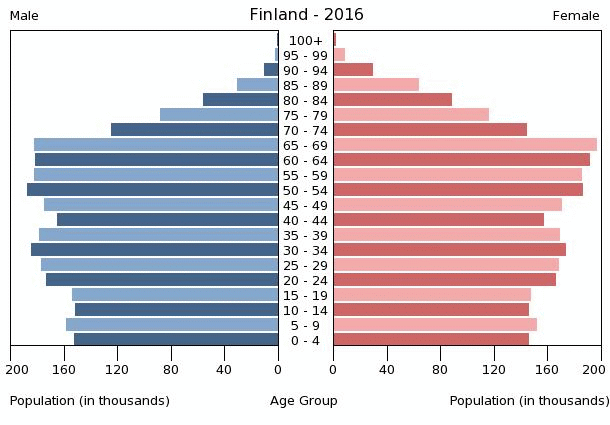Let me open this enigma a bit more. The retirement system in Finland is a pay-as-you-go type of social security, which means that each month the government takes a slice from your monthly wage. This slice is transferred to retirement funds like Ilmarinen, Varma or Elo and these funds invest your and others' future retirement savings to the financial markets. In addition to that, you might want to save for example 100€ per month to stocks or funds, since the monthly money provided by the government at the time of your retirement is relatively small if you want to live wealthy in your retirement days.
This has proven to be a well-functioning system. However, now the retirement system seems more like a ticking time-bomb. As you can see from the figure below, the demographic structure in Finland is shaped in not so good of a way. The population pyramid is shrinking. Soon more people are retiring than there are people in the workforce. This means that less slices are available for the government to transfer them to the people who are starting their retirement.
One macabre but clear solution for this would be to, erhm, "get rid" of the excess people. But, since I'm an amateur-economist and a human, I would suggest a different solution: Let's abandon the pay-as-you-go system and move to a system where each one would save 100 % of their retirement savings themselves and as the way they wish. People can decide whether to start saving for their retirement through ETF's or Bitcoin or Habbo Coin and we don't have to worry on how the future generations would be able to provide money for the growing population in retirement.
If people would be given the opportunity to start investing their retirement funds themselves, of course then the role of investment advisory from banks and other institutions would became even more important. People would have more options from where to choose and they can clearly see where their money is going for. The investment would become more transparent and easier to follow. It would be also easier to make changes as in any investments (which might not be recommended, however).
Also, if you are a true professional and know what to do, you can also try to gain even a higher return for your retirement savings than the retirement fund would provide (I propably wouldn't ). On the other hand if you don't know what to do and don't know where to look for, then you are facing a lot trouble when you're 64.
Now a clear question is that should the government provide some sort of an insurance to cover the lost savings for the individuals who don't know what to do and lose their retirement savings? I would say no. This would clearly raise the existence of moral hazard and more people would be more betting in the markets without risk. Everything should go without government intervention.
There's only one problem on which I haven't figured out an answer. How to do it? How to change the system? If it would happen tomorrow, it would be a disaster. It wouldn't be pareto-optimal. The youngest and the oldest generation would gain since they already have their savings or haven't started yet and the people who would suffer the most are the people who have been in the workforce 10 years or more. They would be returned their current savings of course but their time period to save would be just too short to gain from the reform.
Early steps could be taken by giving tax-exemptions for the population who will suffer the most. Thus they would have more disposable income that they could (and SHOULD) use for saving. But is this kind of a scenario realistic? I don't know. I'm just writing here.
Nevertheless I think it would be a way to be now and in the future. Let's see what is the situation in the economy when I'm sixty-four.




No comments:
Post a Comment